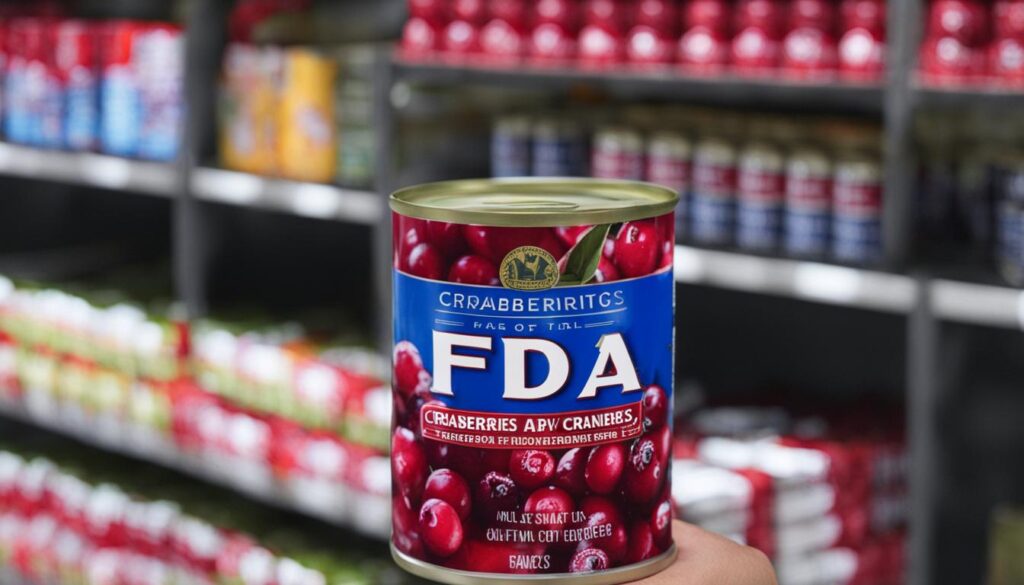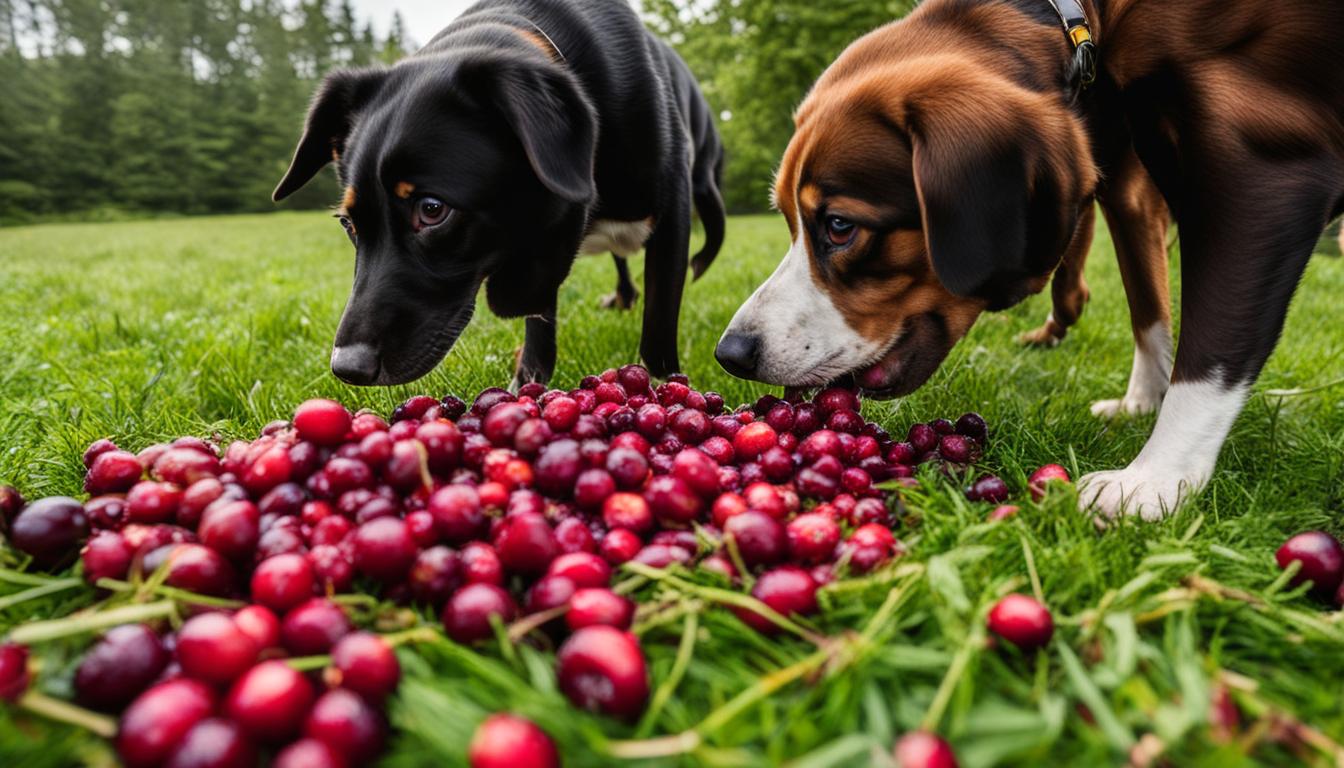Curious whether your furry friend can enjoy the tart and tangy goodness of cranberries? You’ve come to the right place! In this article, we’ll dive into the topic of dogs and cranberries to help you make informed decisions about your pup’s diet. So, can dogs eat cranberries? Let’s find out!
Key Takeaways:
- Cranberries are safe and beneficial for dogs to eat.
- They are packed with essential vitamins, minerals, fiber, and antioxidants.
- Cranberries can support immune health, prevent urinary tract infections, and promote a healthy gut.
- It’s important to offer cranberries plain and in moderation, avoiding cranberry products with added sugars or harmful ingredients.
- Consult with a veterinarian before introducing cranberries or any new food into your dog’s diet.
The Nutritional Value of Cranberries for Dogs
Cranberries offer a range of essential nutrients that can contribute to the overall health and well-being of dogs. These vibrant berries are low in calories and fat, making them a nutritious and healthy snack option. They are also a good source of carbohydrates and fiber, which are important for maintaining a healthy digestive system. In addition to these dietary benefits, cranberries are packed with vitamins and minerals that support various bodily functions in dogs.
The vitamins found in cranberries include vitamin C, which plays a crucial role in immune function and collagen production, and vitamin A, which is important for vision and a healthy coat. Cranberries also contain vitamin E, which acts as an antioxidant and helps protect cells from damage, and vitamin K, which is necessary for proper blood clotting. When it comes to minerals, cranberries are rich in potassium, calcium, manganese, and copper. These minerals play key roles in nerve function, bone health, and enzyme activity in dogs.
The antioxidants present in cranberries, such as anthocyanins and quercetin, offer additional health benefits for dogs. These antioxidants help boost the immune system, reduce inflammation, and protect against diseases like cancer, heart disease, and diabetes. While cranberries provide a range of essential nutrients, it’s important to note that they should only make up a small portion of a dog’s daily diet. A balanced dog food diet should still be the primary source of nutrition to ensure all nutritional needs are met.
Cranberries and Urinary Tract Health in Dogs
Cranberries have long been recognized for their ability to promote urinary tract health in both humans and dogs. They contain compounds that can prevent the attachment of bacteria, such as E. coli, to the walls of the bladder, thereby reducing the risk of urinary tract infections (UTIs) in dogs.
One study found that cranberry extract reduced the adhesion of E. coli bacteria to bladder cells by as much as 80%. This suggests that cranberries may help prevent the bacteria from causing an infection in the first place. Additionally, cranberries contain proanthocyanidins (PACs), which are the compounds responsible for their anti-adhesive properties. These PACs prevent bacteria from sticking to the urinary tract, making it easier for the body to flush them out.
To reap the benefits of cranberries for urinary tract health in dogs, it’s important to offer them in the right form and dosage. Fresh cranberries can be added to your dog’s food as a special treat, or you can opt for cranberry supplements that are specifically formulated for dogs. These supplements typically contain concentrated cranberry extract or powder, providing a higher dose of the beneficial compounds found in cranberries.
Cranberry Supplements for Dog UTIs: Dosage and Considerations
When using cranberry supplements for urinary tract health in dogs, it’s crucial to consult with a veterinarian. They can recommend the appropriate dosage based on your dog’s size, weight, and overall health. It’s important to note that cranberry supplements should not replace proper veterinary care if your dog is experiencing urinary tract issues. They can be used as a preventive measure or as part of a comprehensive treatment plan, as recommended by your vet.
It’s also worth noting that while cranberries and cranberry supplements can be beneficial for dogs, they may not be suitable for every dog. If your dog has any underlying health conditions or is on medication, it’s essential to consult with your veterinarian before adding cranberries or cranberry supplements to their diet.
| Weight of Dog | Dosage of Cranberry Supplement |
|---|---|
| Under 10 lbs | 250 mg per day |
| 10-25 lbs | 500 mg per day |
| 25-50 lbs | 1,000 mg per day |
| Above 50 lbs | 2,000 mg per day |
Remember, cranberries should only be used as part of a balanced diet for your dog, and any changes to their diet or supplements should be made under the guidance of a veterinarian.

Potential Risks and Considerations for Feeding Dogs Cranberries
While cranberries are generally safe for dogs to eat, there are some risks and considerations to keep in mind. It’s important to offer cranberries plain and in moderation, as too many cranberries can lead to an upset stomach in dogs. Additionally, certain cranberry products, such as sauce, jelly, bread, and juices, may contain added sugars or ingredients that are harmful to dogs. It’s crucial to check the ingredients list and avoid giving these products to dogs. Dried cranberries are safe for dogs to eat, but they should be given in small portions and without any added sugars or other harmful ingredients. Lastly, it’s always best to consult with a veterinarian before introducing any new food, including cranberries, into a dog’s diet, especially if the dog has any underlying health conditions or is on a prescription diet.
Table: Cranberry Products to Avoid for Dogs:
| Product | Risks/Considerations |
|---|---|
| Cranberry Sauce | May contain added sugars, preservatives, and other ingredients that are harmful to dogs. |
| Cranberry Juice | May contain added sugars, artificial sweeteners, or other ingredients that can upset a dog’s stomach. |
| Cranberry Bread | May contain added sugars, salt, or other ingredients that are not suitable for dogs. |
“It’s important to offer cranberries plain and in moderation to avoid potential side effects.”
Feeding dogs dried cranberries can be a convenient way to incorporate them into their diet, but it’s important to be cautious of any added sugars or harmful ingredients. It’s always best to choose dried cranberries that are specifically made for dogs and free from any additives. When introducing cranberries to a dog’s diet, it’s essential to start with small amounts and monitor for any adverse reactions or digestive issues. If a dog experiences any negative side effects after eating cranberries, it’s important to discontinue feeding them and consult with a veterinarian for further guidance.
In summary, while cranberries can provide numerous health benefits for dogs, including supporting urinary tract health and offering antioxidant protection, it’s crucial to feed them plain and in moderation. Avoiding cranberry products that may contain added sugars or harmful ingredients is key to ensuring the safety and well-being of your furry friend. Consulting with a veterinarian before introducing cranberries or any other new food into your dog’s diet is always recommended, especially if your dog has any underlying health conditions or is on a prescription diet. Remember, your veterinarian is the best resource for personalized guidance regarding your dog’s dietary needs.
Incorporating Cranberries into a Dog’s Diet
If you’re looking to add some variety to your dog’s diet, cranberries can be a healthy and tasty option. There are several ways you can incorporate cranberries into your dog’s meals and treats to provide them with the nutritional benefits these berries offer. Here are some ideas:
1. Fresh Cranberries:
You can offer fresh cranberries to your dog as a special treat. Make sure to wash the cranberries thoroughly and remove any stems before serving. You can offer them plain or mix them into your dog’s regular food to add some flavor and texture.
2. Homemade Cranberry Treats:
If you enjoy baking for your furry friend, you can make homemade cranberry dog treats. There are plenty of recipes available online that use cranberries as a key ingredient. Just make sure to use dog-friendly ingredients and avoid adding any harmful substances like chocolate or artificial sweeteners.
3. Dried Cranberries:
Dried cranberries can be a convenient on-the-go snack for your dog. Look for dried cranberries that are free from added sugars or harmful ingredients. Keep in mind that dried cranberries are more concentrated than fresh ones, so offer them in smaller portions to avoid overfeeding.
Remember, while cranberries can be a healthy addition to your dog’s diet, they should only make up a small portion of their overall food intake. The majority of their nutritional needs should be met through a balanced dog food diet. If you’re unsure about the right amount of cranberries to feed your dog or have any concerns, it’s always best to consult with your veterinarian.

| Treat Name | Ingredients | Instructions |
|---|---|---|
| Cranberry Biscuits | 1 1/2 cups whole wheat flour, 1/2 cup oatmeal, 1/2 cup dried cranberries, 1/4 cup unsweetened applesauce, 1/4 cup water | 1. Preheat oven to 350°F. Mix all ingredients in a bowl until well combined. 2. Roll out the dough on a lightly floured surface and use cookie cutters to cut out biscuit shapes. 3. Place the biscuits on a baking sheet lined with parchment paper. 4. Bake for 15-20 minutes or until golden brown. Allow to cool before serving. |
| Cranberry Frozen Yogurt | 2 cups plain yogurt, 1/2 cup fresh or frozen cranberries, 1 tablespoon honey | 1. Blend the cranberries in a food processor until finely chopped. 2. In a bowl, mix together the yogurt, chopped cranberries, and honey. 3. Pour the mixture into ice cube trays or silicone molds. 4. Freeze for at least 4 hours or until solid. Serve as a refreshing treat on hot days. |
The FDA’s Perspective on Cranberries for Dogs
The FDA (Food and Drug Administration) plays a crucial role in ensuring the safety and efficacy of food and medical products for both humans and animals. While their guidelines and approvals primarily focus on human health, the FDA does acknowledge the potential benefits of cranberries for preventing recurrent urinary tract infections (UTIs) in healthy women. This recognition indicates that cranberries have valuable properties that can be beneficial in certain contexts.
However, it’s important to note that the FDA’s perspective on cranberries for dogs is not as extensive as it is for humans. As of now, there is no official FDA approval specifically for feeding cranberries to dogs. The FDA’s guidelines for feeding cranberries to dogs are relatively limited, and it’s always best to consult with a veterinarian for specific recommendations.
It’s important to remember:
- The FDA has allowed a Qualified Health Claim for cranberry dietary supplements containing at least 500 mg of cranberry fruit powder.
- This claim is centered around reducing the risk of recurrent UTIs in healthy women, not dogs.
- The FDA’s guidelines and approvals for human consumption do not directly translate to dogs.

While cranberries have been shown to have potential health benefits for dogs, it’s still important to consult with a veterinarian before incorporating them into your dog’s diet. A veterinarian will be able to provide guidance specific to your dog’s individual health needs and ensure that any potential interactions or risks are taken into account.
Conclusion
After considering the nutritional value and potential health benefits of cranberries for dogs, it is clear that they can be a valuable addition to their diet. Cranberries are packed with essential vitamins, minerals, fiber, and antioxidants that promote overall health and well-being. They have been shown to support urinary tract health, prevent UTIs, and offer protection against diseases like cancer and heart disease.
However, it is crucial to feed cranberries to dogs in moderation and in the right form. Plain cranberries or homemade treats are the safest options, as commercial cranberry products may contain added sugars or harmful ingredients. It is always best to consult with a veterinarian before introducing cranberries or any new food into your dog’s diet, especially if they have any underlying health conditions or are on a prescription diet.
In summary, incorporating cranberries into your dog’s diet can provide them with a variety of health benefits. Just remember to offer them plain, in moderation, and alongside a balanced dog food diet. By doing so, you can help support your furry friend’s overall health and well-being.
FAQ
Can dogs eat cranberries?
Yes, cranberries are safe for dogs to eat.
What are the nutritional benefits of cranberries for dogs?
Cranberries are packed with important vitamins and minerals, such as vitamin C, manganese, vitamin E, and vitamin K1.
How do cranberries support urinary tract health in dogs?
Cranberries contain compounds that can prevent the attachment of bacteria to the walls of the bladder, reducing the risk of urinary tract infections (UTIs) in dogs.
Are there any risks or considerations when feeding cranberries to dogs?
It’s important to feed cranberries plain and in moderation to avoid potential side effects. Certain cranberry products, such as sauce or juice, may contain added sugars or harmful ingredients that should be avoided.
How can I incorporate cranberries into my dog’s diet?
Fresh cranberries can be offered as a special treat or added to homemade dog treats. Dried cranberries, without added sugars or harmful ingredients, can also be given as a convenient snack.
What does the FDA say about cranberries for dogs?
While the FDA does not specifically address cranberries for dogs, they have recognized the potential health benefits of cranberries for preventing urinary tract infections in humans.





